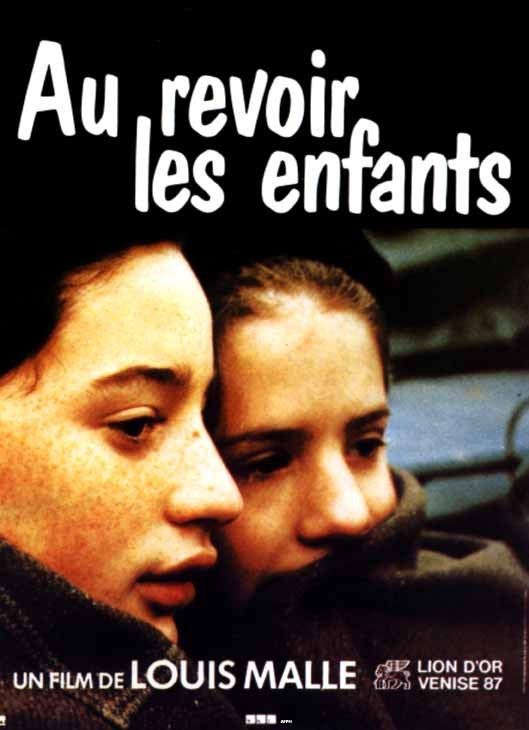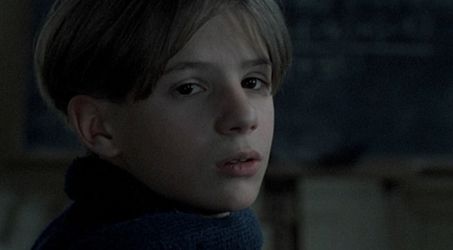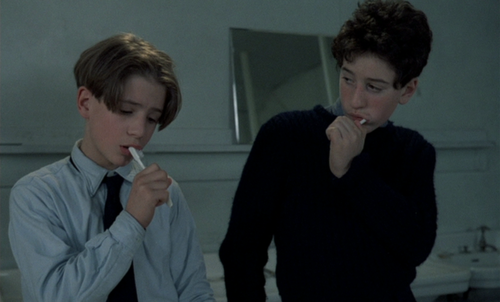Monday, November 26, 2012
Au Revoir, Les Enfants
Au Revoir, Les Enfants
1987
Director: Louis Malle
Starring: Gaspard Manesse, Raphael Fejtö
Julien (Manesse) is a privileged young boy whose wealthy mother sends him to a Carmelite school to get him out of Paris in 1944. He’s a bossy little kid who acts tough but really misses his mom. One day, three new students arrive at the school, and Julien is somewhat fascinated by Jean (Fejtö). Which, of course, means, that Julien starts picking on Jean. Ultimately, though, the two form a friendship, each an outsider in their own way. Julien slowly starts to realize that Jean is hiding a secret. This is 1944 Paris. I’ll give you three guesses what Jean’s secret is, and the first two don’t count.
The performance of the two young boys, Manesse and Fejtö, is outstanding, and ultimately, that is what makes the film really succeed. The characters they depict, Julien and Jean, are never, not once, stereotypical movie children. They are never sweetly precocious or overtly mugging. Instead, both are completely naturalistic; mean at times, sympathetic at times, but never forced. Manesse, in particular, turns in one of the most refreshingly low-key child performances I’ve ever seen. I was reminded several times in this film of Truffaut’s The 400 Blows (not surprising, given that Malle was also part of the French New Wave movement), and Julien certainly shares a movie lineage with Antoine Doinel.
As a WWII movie, there is a certain inevitability to the film, but Malle doesn’t really focus on the war. Instead, the focus is squarely on the boys at school. This is much more a school film set during war time than an outright war film. Their little tricks on one another, the bartering for treats or prizes, music lessons, schoolyard games, the treat of getting to watch a Charlie Chaplin film; these are the scenes that propel the film forward, not those of soldiers. And yet, every now and then, when we’ve let our guard down, Malle reminds us that yes, indeed, although the school is somewhat escapist, there is still a war going on. There are soldiers who just finished their baths when the boys take a school trip to the bathhouse. Jean and Julien are brought back to the school after getting lost in the woods by Nazi soldiers. A Jewish gentleman at a fancy restaurant is asked to leave by the French collaborationist militia. In many ways, I’m grateful to Malle for not making a WWII movie that I had seen before.
Given that so much of the focus of the film is on the school, I’d like to address certain points about its depiction. God bless Malle for avoiding nearly every movie school stereotype. The teachers are not viciously evil or gloriously inspiring. Instead, they are real people. Shocking! The other students at the school avoid labels. If I’m watching a school movie, I’ve come to expect The Fatty, The Geek, The Clown, The Outcast, etc. Au Revoirs, Les Enfants really doesn’t have this. Julien is most certainly not The Hero, and despite his status, Julien never really feels like The Victim. The boys just seem honest. Just boys. Thank goodness Hollywood didn’t get its grubby little hands on this story, because it would be a completely different film.
As a teacher, it’s somewhat encouraging to watch this movie and realize that adolescent boys were little hellions in the 1940s too; misbehavior in my classroom is nothing new. They’re awful to one another. And yet, everyone seems to take it in their own bizarre stride. It seems the fate of nearly every student at the school to be alternately picked on and pummeled, then for them to do the pummeling and teasing. Basically, everyone bullies everyone else. In class, students goof off the second the teacher’s backs are turned, and order is barely maintained at mealtimes. Contraband and pornography make their way easily through the group of boys. Despite all of this, Malle seems to paint this simply as boys letting off excess adolescent energy. And, to be fair, he seems to have a point; the boys do appear to be learning things at the school in spite of their desperate attempts to avoid learning anything.
The color palette of the film is rather depressing. Decidedly cold and chilly, we see almost nothing but whites and steely blues and grays. The film is set over the winter term at the school, and I almost felt cold watching all the boys shivering in their gray classroom. We are reminded later in the film that these boys come from privileged background, but you wouldn’t know it looking at the school. The colors of the film give it a constant evocation of sadness, as if you can’t help but feel a little down because there is no visible brightness or warmth in front of you. Instead, the warmth comes from the relationships in the film, of the slowly developing bond between Jean and Julien.
I once read Louis Malle described as a “gentle” director. That adjective really stuck for me. Au Revoir, Les Enfants certainly fits that description. It’s a gently devastating French WWII film. After all, this is a WWII film, so you must have some concept of the ending. What’s different in Au Revoir, Les Enfants is that Malle delivers his ultimate blow in such a soft, unexpected way, like a sweet death. It is still a potent blow, but we are given little of the tragic, bleak lead-up to the finale. We are so much like Julien, not really understanding exactly what is happening around him, and suddenly having the rug jerked out from underneath him.
Arbitrary Rating: 8/10
Labels:
1001 movies,
1980s,
1987,
8 out of 10,
au revoir les enfants,
foreign,
french,
malle
Subscribe to:
Post Comments (Atom)



Good review. Thanks for the perspective on it from a teacher's point of view.
ReplyDeleteI've read that Malle based this film on a real experience of his from his own childhood, but that he has refused to go into any details.
This film also started the career of Irene Jacob. (She played the piano teacher.) It was a small role, but a few years later when Kieslowski was looking to cast the lead for his film The Double Life of Veronique he was at first unsure of Jacob's screen presence. He was then asked if he had seen Au Revoir les Enfants. He said yes. He was then asked if he remembered the piano teacher. He said yes, then it hit him that Jacob had played that part and even though it was quite small it still stood out for him. He then cast her in the lead for Veronique, and then his later film Three Colors: Red.
Yes, I had heard that about Jacob! I came to this film after falling for Jacob in Red, and I'm kind of saving The Double Life of Veronique - meting out my remaining Kieslowski so as not to consume it all at once. I was surprised to see her pop up in Au Revoir Les Enfants in such a small role, but then I read that this was her "big break."
DeleteI'd also heard that it's rumored this is based on a real event in Malle's life, but also that he did not confirm or deny (just broke into tears after its screening). If so... jesus christ, what a weight to bear.
Au Revoir, Les Enfant was par of our curriculum in French class back in high school (together with Le boucher!). It made a huge impression on me back then and it still does. You are absolutely right, this is a real school with real children and it is amazing how Malle manages to see the events from the viewpoint of the children. Whe finally disaster stikes I sat back with the same panic and bewilderment as Julien. That is quite an achievement.
ReplyDeleteI think this would be a FANTASTIC movie as part of a French class curriculum! I completely understand it making an impression on you. I wish the French classes in my school showed it.
Delete